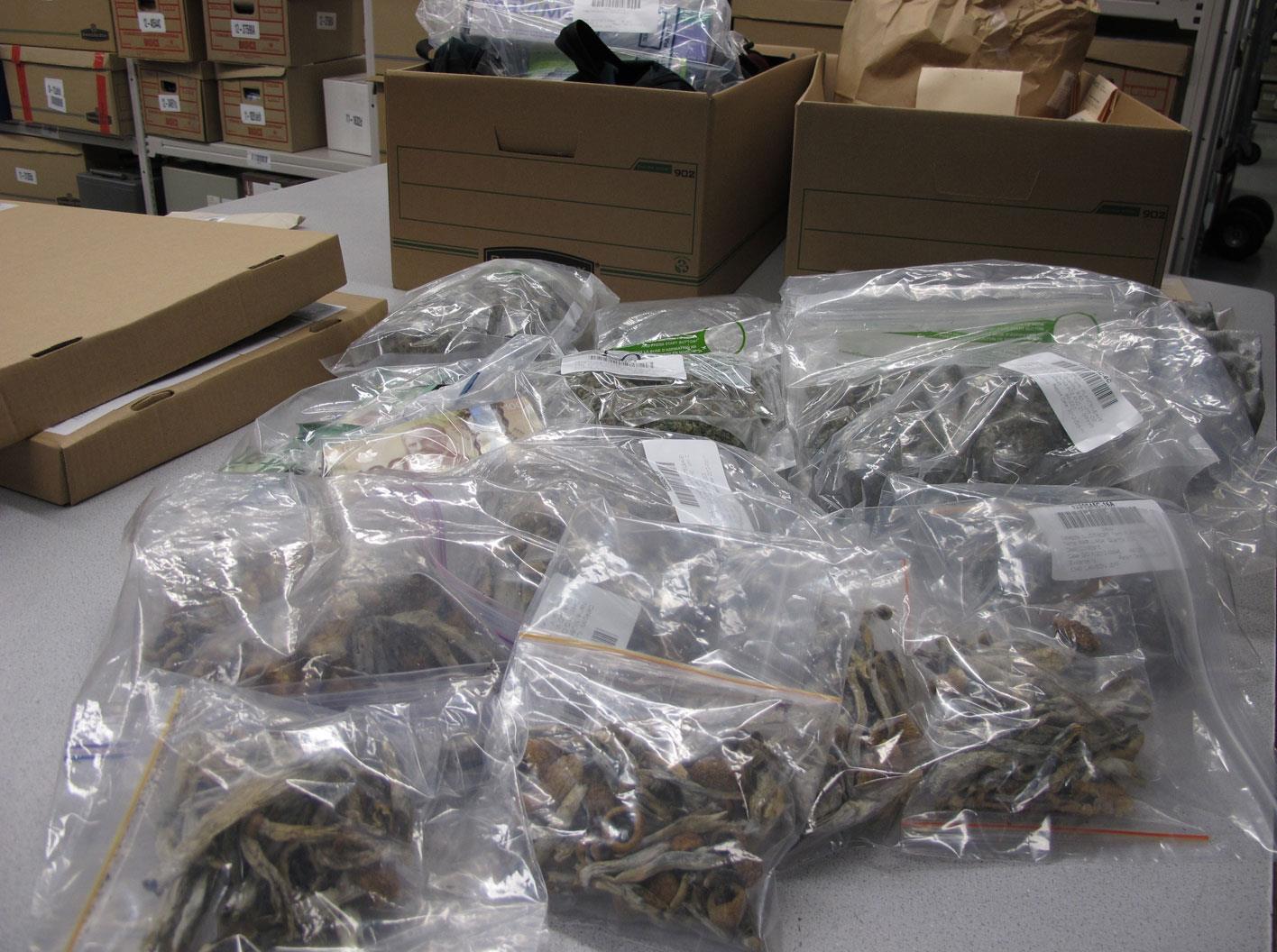Police have seized increasing quantities of psilocybin mushrooms in recent years, new research has found. This has happened amid growing public interest in psychedelic drugs, and as some cities and states have rolled back associated criminal penalties. The enforcement figures underline the reasons for decriminalization, while raising the questions of whether they indicate that more people are using psilocybin—and if so, why.
The new study was published in the journal Drug and Alcohol Dependence on February 6. It examined over 4,500 seizures of psilocybin between 2017-2022. The researchers studied data from the federal “High Intensity Drug Trafficking Areas” (HIDTA) program, through which federal, state, local and tribal law enforcement cooperate on drug busts under 33 joint task forces around the country.
Annual seizures increased from 402 in 2017 to 1,396 in 2022. The total increased each year during this period, with a pronounced jump in 2021, when it rose by 400. Seizures increased over 368 percent between 2017 (quarter 1) and 2022 (quarter 4).
Psilocybin arrests represent only a tiny fraction of all drug arrests—but a growing one.
By region, police made the most psilocybin seizures in the Midwest (36 percent of the total), followed by the western region (33.5 percent). Ohio was the state that saw the highest number of seizures, followed by Florida, Michigan, Texas and Colorado. Ohio, Florida and Texas were also among the five states where seizures increased most over the five-year period, together with Utah and Michigan. By raw weight of the drug, police seized the largest total quantity in the western region; Nevada was the state with the highest figure.
Psilocybin arrests represent only a tiny fraction of all drug arrests, of course—but a growing one. From the same data source, the researchers found that total drug seizures increased from 74,663 in 2017 to 106,409 in 2022. Psilocybin’s proportion of the total more than doubled over the five years, to 1.31 percent.
The study authors speculated that these figures may reflect increasing availability of psilocybin—that cops could be finding more because there is greater supply—although they acknowledged that seizures don’t demonstrate prevalence. They also suggested potential reasons for this.
“There has recently been an increase in trials testing psilocybin, specifically, for treating psychiatric conditions,” they wrote. “Research has found that media coverage of the medical benefits of use of drugs like ketamine and MDMA appear to be linked to increased willingness of some people to use non-medically, which may also be applicable in the case of psychedelics such as shrooms.”
Decriminalization and limited legalization of psilocybin in some cities and states may also have influenced rates of use, the researchers suggested. They noted that the western region, with the highest weight of psilocybin seizures, has seen reforms like decriminalization in Denver, Oakland and Seattle, and voter-approved measures to legalize limited use in Oregon and Colorado. Michigan, among the top five states for seizures, has seen Detroit and other smaller cities decriminalize.
However, the study doesn’t give any detailed breakdown on county or city levels, meaning we can’t really assess the implications. Take California, for example: Even though cities like San Francisco and Oakland have decriminalized psilocybin, that obviously doesn’t change anything for residents of other cities, suburbs and rural areas.
“County-level analysis can be done using these data, but I’m not sure if we’d be able to examine differences in law enforcement,” Joseph J. Palamar, PhD, associate professor at NYU Langone Health and lead author of the study, told Filter. “I do think that in general, police are focusing mainly on drugs like fentanyl. It’s also unknown to what extent shrooms were present with other drugs during busts. For example, there could be busts involving fentanyl and cocaine that also happen to involve cannabis and/or shrooms.”
“While decriminalization is commonly associated with law enforcement stepping back in general, this may not be the case everywhere.”
The researchers acknowledge that their findings tell us a very limited amount about local supply. Drugs move between many different states, so a quantity seized in California, say, could be on its way to Idaho. And HIDTA joint task forces may have very different priorities and resources in different parts of the country, resulting in psilocybin seizure rates that reflect these factors, not local supply. In addition, the “weight” of psilocybin seizures has limited validity because of the difference between “wet” mushrooms that are not yet ready for consumption and “dry” ones. Products like psilocybin-infused edibles will confuse weight measures even more.
In some states, people have responded to policy changes by going beyond what the law allows, for example opening illicit shops selling mushrooms.
“It’s very possible that in some cities, law enforcement may be targeting stores that sell illegally. And they did bust growing operations,” Dr. Palamar said. “While decriminalization, for example, is commonly associated with law enforcement stepping back in general, this may not be the case everywhere. In some cities, officers may still actively go after people who sell—especially large amounts.”
However, as Filter has reported, psychedelic decriminalization measures in Denver and Oakland have succeeded in reducing or preventing associated arrests, as well as medical emergencies and hospitalizations related to psychedelic use. Palamar supports increased education and harm reduction around psychedelics.
Efforts to prevent rising psilocybin arrests and seizures have included a federal bill, introduced in September 2023, seeking to discourage federal law enforcement from intervening in jurisdictions that have legalized or decriminalized. Meanwhile, activists have launched statewide efforts to decriminalize or legalize psilocybin in California and Massachusetts.
Image of seized psilocybin mushrooms and cannabis by Victoria Police Department via Facebook





Show Comments